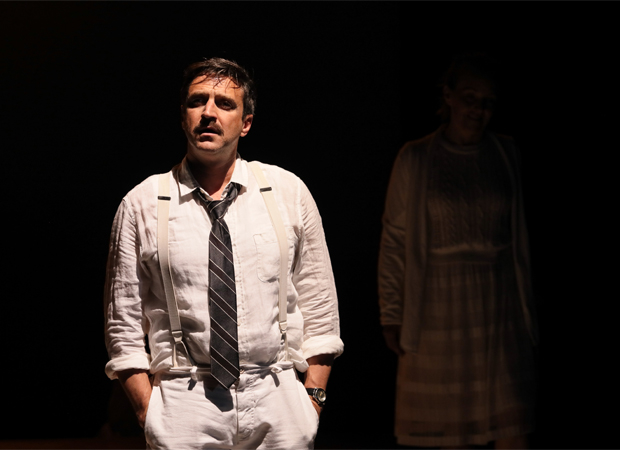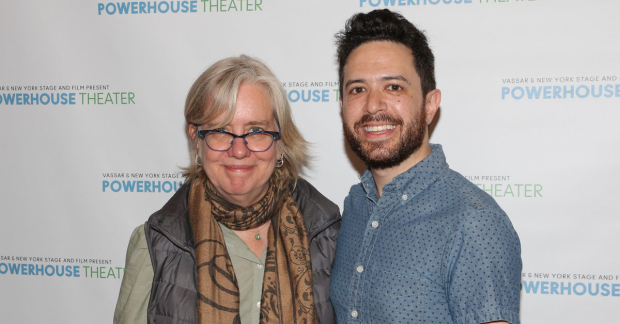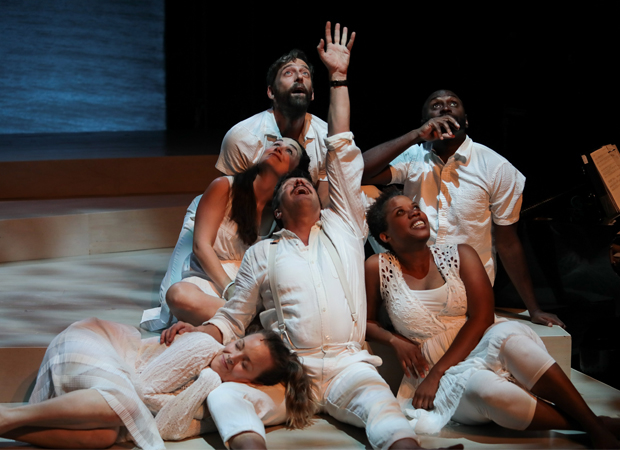Raúl Esparza, Adam Gwon, and Lisa Peterson Ride The Waves
With a score by David Bucknam, this musical, based on a Virginia Woolf novel, resurfaces decades after it premiered.
Twenty-eight years ago, two young writers named David Bucknam and Lisa Peterson premiered The Waves, a musical inspired by the Virginia Woolf novel of the same title, at New York Theatre Workshop. It was a brief, warmly received run of 37 performances, and Bucknam earned a Drama Desk Award nomination for his work. He eventually got into teaching; Peterson went on to direct.
Bucknam took his own life at the age of 32 in 1998 under circumstances that Peterson still doesn't fully comprehend. But he left behind a legion of fans, friends, and students, two of whom are the composer-lyricist Adam Gwon, Bucknam's student at NYU, and the actor Raúl Esparza, his student at Playwrights Horizons. All three felt a certain amount of unfinished business, particularly when it came to The Waves, a musical that, for a time, only existed in memory, cassette tapes, and handwritten sheet music.
Now, this trio has revisited The Waves to give it the second life they knew it richly deserved. Currently running at New York Stage and Film and Vassar's Powerhouse Theater, it's being developed with Peterson directing, Gwon composing original music, and Esparza starring and providing creative consultation. It's a passion project for all involved.

(© Buck Lewis)
Tell me the origin story of The Waves, both the original production and this one.
Lisa Peterson: I had read The Waves and thought it felt like a play. I did a 45-minute nonmusical adaptation of it as an intern at the Hangar Theatre in Ithaca, New York. I met David Bucknam and I cast him in that first version as Bernard, the part Raúl is playing now. David and I became best friends, and he said he wanted to make a musical out of it. At the time, I said it was a bad idea. I was being very strict with us. Everything the characters said had to be in Virginia Woolf's language.
He did it anyway, and Robert Moss, who was running the Hangar, heard a concert David gave and programmed it. That must have been 1984 or 1985. Jim Nicola, a friend of Robert Moss, had just taken over New York Theatre Workshop, and he saw it and said, "let's do it in New York." It went very well and was received very enthusiastically by critics, but we never made a recording of it, and David and I kind of moved on from there.
I started directing a lot, and David started teaching a lot, and then he got mysteriously ill. To this day, I don't really know what happened, but it did affect him psychologically. He took his own life in 1998. After that, Jim Nicola and Raúl and I started talking occasionally about bringing it back to life. We did a reading in 2000 at New York Theatre Workshop and nothing came of that.
Raúl Esparza: I wasn't part of the 2000 reading, but we always came up with the same idea: How are we supposed to do it without David? I had never seen the piece, but I heard a lot of music from it and had tapes that David made through the years of various readings.
Last summer, there was a big event honoring André Bishop at Lincoln Center. Afterwards, at the dinner, Bob Moss sat next to me and said, "Bring back The Waves." I called Lisa. We said we have to treat it as though it's a new musical. It is opening up a can of worms to work on a musical when the composer's not around. And we're not interested in "reviving" it.
Lisa: It felt like it needed to be matured. Sidebar: Before Raúl and I started talking about it, Adam Gwon had asked me to direct a workshop of his musical String. That's when I learned about the David connection for you.
Adam Gwon: I was studying performance at [NYU's] Tisch [School of the Arts]. David was one of those magical teachers. I had never heard any of his music. We all knew he was a composer, but he was our musical-theater-acting teacher. At the end of that year, there was a memorial service for him that was a concert of his music. Raúl sang in it. They did two songs from The Waves. I was so inspired hearing his work that I started writing that summer. When Lisa invited me on board to bring it back, I jumped at it.

(© David Gordon)
What is it like to come back to this piece and be confronted by the ghosts of your past, sort of like in the story itself?
Lisa: When a song that's great that he wrote comes back to life in front of you, I can feel David in the room. I get flooded with emotions sometimes. But then, on the other hand, I feel like Adam is weaving using the thread that David spun. It's incredible to me to watch it both come back to life and have the ability to change it.
Adam: There is a strange sense, in both a joyful and macabre way, of communing with the dead working on this piece. Exhuming this old music literally from basements and boxes, and trying to refasten it into something that is new and breathing, has been really thrilling, even if it's sort of eerie sometimes.
One of the exciting things we discovered is the timelessness, not only of the Virginia Woolf stuff, but of the music that David wrote. It does have the power to move people and connect to people today, and needs to be heard. We approached this from the beginning as one big experiment, and the takeaway is that it does speak to people.
Raúl: You can actually hear the audience crying from the stage. I haven't done a lot of shows where that happens, where something really true is being put in front of an audience and they recognize themselves.
What I think is most extraordinary about it is the way that the Virginia Woolf material resonates everywhere. She had a way of naming things that seem unnamable, the things that you didn't think could be articulated about life, whether it's girls at a dance figuring out who they're going to be after they graduate from school, or a man coming to terms with the fact that he's not going to be all the things he thought he would be now that he's in his mid-40s.
There's the extra emotional weight of recognizing that I'm helping put David's voice out there, which felt like unfinished business to me. He put together an audition book for all of his students. In the back of that book, I had one song from The Waves, "Byron," that I never sang but always kept, always wondering if one day I would do it in a concert or sing it at an audition. And Sunday, during the performance, I became quite emotional, because there I was, singing that song in front of an audience. It really hit me.

(© Buck Lewis)







